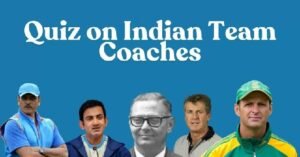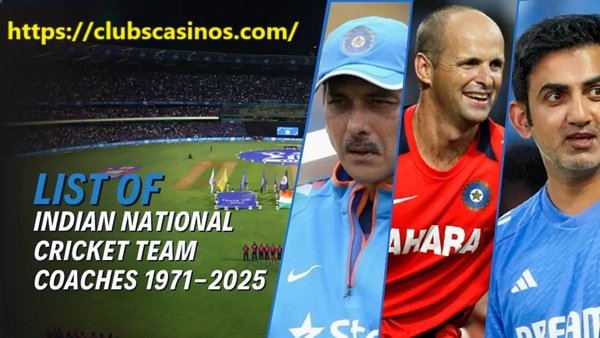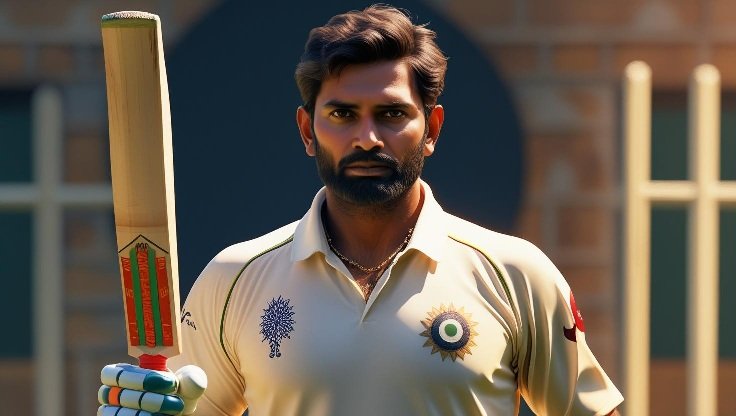The Indian National Cricket Team is among the most celebrated teams in the world, boasting a glorious history of wins, records, and cricketing legends india national cricket team coaches. Behind this success are not only the players but also the coaches who have been instrumental in shaping India’s journey on the global stage.
In this comprehensive guide, we take a deep dive into the list of India national cricket team coaches, their tenure, achievements, and their impact on Indian cricket from the early 2000s to the present day in 2025.
📜 Introduction to the Role of Cricket Coaches
A cricket coach is more than just a strategist; they act as a mentor, guide, and sometimes a motivator who helps players reach their full potential. The coach is responsible for:
-
Team Strategy and Planning
-
Skill Development and Training Sessions
-
Mental Conditioning and Morale Boosting
-
Tactical Decisions and Match Preparations
In Indian cricket, the coach’s role has evolved significantly, especially since the early 2000s when foreign coaches were first introduced. This article covers all the head coaches of the Indian national team and highlights key assistant coaches who have made notable contributions.
🏏 List of Indian National Cricket Team Coaches (Men’s Team)
1. John Wright (2000–2005)
John Wright became the first foreign coach of the Indian cricket team. His appointment marked a turning point in Indian cricket’s modern era.
Notable Achievements:
-
India reached the 2003 ICC World Cup final.
-
India won a famous Test series against Australia in 2001.
-
Helped nurture talents like Yuvraj Singh, Harbhajan Singh and Virender Sehwag.
Impact:
Wright’s calm demeanor and professionalism introduced a more structured coaching approach to Indian cricket.
2. Greg Chappell (2005–2007)
Greg Chappell, the former Australian captain, succeeded John Wright and was known for his controversial stint.
Notable Moments:
-
Introduced the concept of rotation policy.
-
India performed well in bilateral series but failed in the 2007 World Cup.
Controversies:
-
Frequent disputes with senior players, notably Sourav Ganguly.
-
Critics blamed his tenure for poor team morale.
Impact:
Though his period ended in controversy, Chappell’s tenure saw the emergence of MS Dhoni.
3. Gary Kirsten (2008–2011)
Gary Kirsten from South Africa is often remembered as India’s most successful coach.
Key Achievements:
-
India won the ICC Cricket World Cup in 2011 after 28 years.
-
India became the No.1 ranked Test team in the world.
-
Excellent man-management skills, especially with MS Dhoni and Sachin Tendulkar.
Impact:
Kirsten’s calmness and tactical intelligence helped Indian cricket achieve historic success.
4. Duncan Fletcher (2011–2015)
Duncan Fletcher took over from Kirsten after the 2011 World Cup triumph.
Highlights:
-
India won the ICC Champions Trophy in 2013 under MS Dhoni.
-
Overseas Test performances remain inconsistent.
-
Oversaw the transition period from Dhoni to Virat Kohli’s leadership.
Impact:
Fletcher maintained a low profile but contributed to the development of many young players.
5. Anil Kumble (2016–2017)
Former India spinner Anil Kumble served as head coach for a brief but impactful period.
Highlights:
-
India became No.1 in ICC Test rankings.
-
Successful Test series wins against Australia, New Zealand and England.
-
His strict approach has led to conflicts, especially with captain Virat Kohli.
Impact:
Kumble’s tenure emphasized discipline and fitness but ended prematurely due to disagreements with players.
6. Ravi Shastri (2017–2021)
Ravi Shastri, a former India all-rounder and commentator, has had two stints (including interim role) as head coach.
Major Achievements:
-
India retained the Border-Gavaskar Trophy in Australia in 2018–19 and 2020–21.
-
India reached the semi-finals of the 2019 World Cup.
-
Dominated Test cricket under Virat Kohli’s captaincy.
Impact:
Shastri’s aggressive style suited India’s fearless brand of cricket, especially in Tests.
7. Rahul Dravid (2021–Present)
Rahul Dravid, known as “The Wall,” took over in 2021 and continues as head coach as of 2025.
Key Contributions:
-
Focused on grooming young players like Shubman Gill and Ishan Kishan.
-
Managed the transitional phase after Virat Kohli and Rohit Sharma’s leadership.
-
India reached the final of the ICC World Test Championship in (2023).
Impact:
Dravid’s coaching philosophy emphasizes discipline, patience, and building future-ready squads.
🏆 Summary Table: Indian Cricket Head Coaches (2000–2025)
| Coach Name | Tenure | Major Achievement |
|---|---|---|
| John Wright | 2000–2005 | 2003 WC Final, Border-Gavaskar Trophy |
| Greg Chappell | 2005–2007 | 2006 ODI wins but WC failure |
| Gary Kirsten | 2008–2011 | 2011 WC Win, No.1 Test Team |
| Duncan Fletcher | 2011–2015 | 2013 Champions Trophy, Test struggles |
| Anil Kumble | 2016–2017 | No.1 Test Ranking |
| Ravi Shastri | 2017–2021 | Historic win for Australia, WTC finalists |
| Rahul Dravid | 2021–Present | Youth Development, WTC Final (2023) |
🟣 Notable Assistant and Support Coaches

India’s coaching setup also features key support roles:
-
Batting Coaches: Sanjay Bangar, Vikram Rathour
-
Bowling coaches: Bharat Arun, Paras Mhambrey
-
Fielding Coaches: R Sridhar, T Dilip
-
Mental Conditioning Coach: Paddy Upton
These specialists have been crucial in improving fitness, fielding standards and mental toughness.
💡 The Shift from Foreign to Indian Coaches
From John Wright to Gary Kirsten, India have had several foreign coaches who brought a fresh perspective. However, since Anil Kumble, the BCCI has leaned towards Indian coaches, emphasizing:
-
Better communication
-
Understanding Indian cricket culture
-
Grooming talent from domestic circuits
This shift aligns with the BCCI’s long-term goal of building a self-sustaining coaching ecosystem.
📌 Indian Women’s Cricket Team Coaches
India’s women’s team has also seen significant growth with key coaches like:
-
VS Raman (2018–2021): Helped India reach the final of the T20 World Cup.
-
Ramesh Powar (multiple stints): Focused on fitness and aggressive play.
-
Amol Muzumdar (2023–present): Current head coach, focused on youth and performance in global tournaments.
🌍 Coaches for India ‘A’ and Youth Teams
Rahul Dravid’s successful tenure as India A and U-19 coach proved how structured coaching can build future stars like Prithvi Shaw, Shubman Gill and Rishabh Pant.
Current India ‘A’ coaches for 2025 include:
-
Sitanshu Kotak (batting coach)
-
Laxmipathy Balaji (bowling coach)
This talent pipeline is key to India’s sustained global dominance.
🏆 Impact of Coaches on Indian Cricket’s Growth
✅ Better Fitness Culture
Modern coaches have enforced strict fitness standards through Yo-Yo Tests.
✅ Tactical Awareness
Emphasis on match simulations, scenario-based training, and analytics.
✅ Mental Strength
Mental conditioning coaches have improved India’s performance in pressure situations.
✅ Bench Strength Development
Under Rahul Dravid, India built bench strength, evident during the 2020 Australia series when the second-string team won.
🚩 Challenges Faced by Indian Coaches
-
Media Pressure: Every loss is heavily scrutinized.
-
Scheduling Strain: A packed calendar leaves little time for conditioning.
-
IPL vs National Team Balance: Balancing player workloads with domestic leagues like the IPL.
🎯 What’s Next for India National Cricket Team Coaches?
As we move into the second half of the 2020s, the role of coaches in Indian cricket will expand further:
-
Greater use of data analytics
-
Focus on multi-format specialization
-
Stronger emphasis on mental health and player wellbeing
-
More structured feeder systems through the India A and U-19 pathways
The search for the next World Cup and Test Championship trophies continues with Rahul Dravid at the helm, or perhaps a new era could emerge by 2026.
📝 Conclusion
The journey of India’s national cricket team coaches mirrors the evolution of Indian cricket itself. From the transformational tenure of John Wright to the modern-day strategies of Rahul Dravid, coaches have left an indelible mark on Indian cricket.
Their role remains central to not just winning trophies but building a legacy of excellence, fitness and mental resilience. As Indian cricket grows into a global powerhouse, the coach’s chair remains one of the most challenging yet rewarding positions in the cricketing world.
Read Also: Clubs Casinos




Leave a Reply